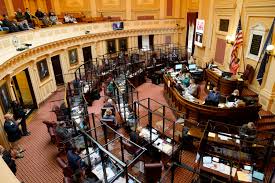
Virginia Senate Chambers. Photo credit:AP
by Dick Hall-Sizemore
The page 1 lead story of Saturday’s Richmond Times-Dispatch announced what anybody who had been paying attention already knew: the General Assembly will not be taking up the biennial budget bill when it convenes on Wednesday. However, that does not mean the legislators will be able to leave early. They have a full docket to consider: 26 gubernatorial vetoes and over 100 bills returned with amendments recommended by the Governor.
I haven’t taken the time to go over all the bills sent back with recommendations, but there are at least a couple that should be of interest to Bacon’s Rebellion readers.
HB 158 (Byron, R-Lynchburg). This bill addressed an area of much complaint in Bacon’s Rebellion over the past two years: the Governor’s almost unlimited emergency powers. As finally enacted with bipartisan votes in both houses, the bill provides that no rule or order issued by the Governor during a declared state of emergency shall be effective beyond 45 days of its issuance, unless the General Assembly takes action.
Governor’s recommendation: The Governor proposed to extend the time frame to 90 days during which any rule or order issued by the Governor during a declared emergency may remain in effect before the legislature must take action. Further, the Governor’s recommendation provides that any such limitations “shall not apply to the Commonwealth of Virginia Emergency Operations Plan.”
Comment: This latter provision could prove to be a big loophole. State law provides that the Virginia Emergency Operations Plan “provides for state-level emergency operations in response to any type of disaster or large-scale emergency affecting Virginia.” [Emphasis added.] That language could be read to exempt from the time limits any action under a declaration of emergency to deal with a pandemic.
HB 1138 (Reid, D-Loudoun). As introduced and passed, this was one of those obscure local government bills applicable to one jurisdiction and of interest only to those directly involved. The Loudoun County School Board had decided that it wanted to set up its staggered terms differently than provided in special legislation passed several years earlier. The General Assembly accommodated their request in the 2021 Session, but the Board had evidently decided it wanted to meet at a different time to draw lots to see who initially got four-year terms and who got the two-year terms. As passed, the legislation authorized the Board to draw lots at its first board meeting in 2023.
Governor’s recommendation: Governor Youngkin has seized on this bill as a means to continue stirring the cultural wars in Loudoun County. Of the nine members of the school board, the terms of seven of them expire on December 31, 2023. The substitute bill submitted by the Governor would cut short their terms by one year and require an election in November of this year to fill all nine seats.
Comment: If the Senate Democrats stick together, they will be able to reject the Governor’s recommendation. Even if a Democratic Senator would vote to accept the Governor’s recommendations (and there are a couple of wild cards among the Senate Democrats), it is my opinion that the recommendation will not get the required number of votes in either chamber. Article VII of the Virginia Constitution defines “special act” as “a law applicable to a county, city, town, or regional government,” and specifies that “for enactment shall require an affirmative vote of two-thirds of the members elected to each house of the General Assembly.” A bill that applies only to Loudoun County is a special act.
The Governor has been pushing the legislature to pass a budget bill. He has used ads as well as an appearance on a national television show to urge passage of a budget. The legislators are not in a hurry. Here is a prediction: the Governor has sent back a lot of their legislation with recommended amendments, including some with only a clause requiring reenactment at the 2023 Session. Democrats in the Senate are likely to reject a lot of those recommendations and send them back to the Governor as originally passed. When that happens, the Governor will have 30 days in which to take action: (1) sign the bill as returned to him; (2) veto the bill; or (3) allow the bill to become law without his signature. Senate Democrats are likely to delay taking any action on a budget bill until they see what the Governor does with any of the bills they sent back. Judging from their reaction to his first set of vetoes, another round of vetoes will put them in even less of a mood to compromise on the budget.
Even after acting on the Governor’s vetoes and recommended amendments on Wednesday, the General Assembly will not be through with its 2022 business. In addition to the budget bill to be decided (sometime) in the Special Session, there are 45 bills left in conference when it adjourned the Regular Session in March and carried forward to the Special Session. There are also two vacancies on the Virginia Supreme Court to fill, as well as a vacancy on the State Corporation Commission. When it is in town Wednesday for the “veto” session, it could convene on Tuesday or Thursday in Special Session to take care of some of this unfinished business. However, there is no indication on the legislative calendar that they plan to convene in Special Session this week.


